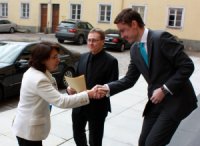Commissioner Damanaki presents Common Fisheries Policy Reform in Estonia

Hearing at the Estonian Parliament
Tallin, 3 May 2012
Commissioner Maria Damanaki visited Tallin to discuss the on-going reform of the Common Fisheries Policy with the Estonian government and to participate in a meeting with the Estonian Parliamentary Committee for Agriculture and Fisheries on the same topic. Ms Damanaki had a bilateral meeting with Ms Keit Pentus, Estonian Minister for Environment, responsible for natural resources management. The new EU fisheries policy will aim at preserving fish stocks at sustainable levels for the benefit of current and future generations by managing fisheries in a responsible, science-based way. Regionalisation of the policy making is an important aspect of the reform and Commissioner Damanaki put emphasis on finding solutions for the Baltic Sea during her visit.

Dear Mr Chairman, honourable Members,
I am delighted to be in Tallinn today and discuss our proposals on how to reform the Common Fisheries Policy with you. I know this country is committed to sustainability, because I had a chance to read the position of your House from February this year on our reform proposals. I wish that other Parliaments and MS were as clear and succinct in presenting their position as you have been. As a Commissioner from a Mediterranean country I think I am entitled to say that we in the south can learn something from you in this respect.
If I am here today it is to ask this House to help me bring about a real reform. I know that this is also what you want.
I know that we agree on the objectives, but we don't always agree on how to get there. We agree that we need environmental, economic and social sustainability.
For environmental sustainability we need to bring our stocks to Maximum sustainable yields by 2015 and phase out discards.
This can bring economic sustainability: only by restoring our fish stocks, we will be able to offer adequate catches and an adequate income for fishermen. I have concrete proof of this, because in the past two years we have started to reap the benefits of the sustainable management of the previous years. In the Northern fishing grounds of the EU, we have now increased quotas, and the fishermen will have an extra 135 million euro in their pockets. I want to increase this also in future years and especially see to it that the Baltic Sea profits as well. We have figures from the New Economics Foundation proving that if we reach MSY we can have 25-30% increase of the income of our fisheries and 80 000 more jobs in the sector by 2022.
And this brings us to social sustainability: your industry has formidable know-how, and we must empower fishermen to bring it into the everyday management of fisheries. I also agree with you that they deserve proper support to switch to sustainable practices and adequately market their products.
You want more flexibility on the targets for MSY. But if we are to achieve sustainable levels for all the stocks, we must set a deadline for it.
I am grateful for your support to stop discards. I know it is not a big problem in the Baltic Sea, but let me tell you it is in the North Sea and in the Atlantic and this practise can damage the reputation of fishermen also in the Baltic Sea. This is why I need your full support to stop this in the Reform. I know that would like to have undersized fish used for human consumption. Well the reason why I am very uneasy about this is that in the Mediterranean consumers are actually driving a market for undersized fish with their bad habit of eating juveniles. I know at that this is not the case in the Baltic Sea.
You have also been very positive on TFCs and I know that you have made very good experiences in this country with TFCs. Actually we had looked at the Estonian case when we made our proposal, because it was really impressive what you achieved. You decreased 30% of your fleet and the vessel owners that have remained today are more profitable than they used to be. This is what I would want also for other MS, but the discussions are proving quite difficult on this subject. I fully share your view that TFCs are linked to fishing capacity and therefore we also need to look at the obligation for Member States to certify that their vessels' engines have the power they claim to have and not more. This obligation will come into force on 1 January 2013 and we need to revisit this issue again then.
I have also read in your opinion that Community led scrapping schemes have not worked and I know you propose a one off scrapping scheme to help the sector one last time to a subsidy free future. Well, the European Court of Auditors was not positive on scrapping undertaken with taxpayer's money and what is more I don't know which Finance Minister still wants to spend money on scrapping fishing vessels, when we have so many more problems to deal with and people are loosing their jobs and livelihood, because of the economic crisis.
When it comes to Regionalisation we are on the same page again, we both want producers and fishermen to become real actors, who decide how to implement rules, how to manage the resource and how to work together. And they will be able to do all this not just among Estonians, but also with their colleagues from across the border.
Here is one area in which your very good experience with BALTFISH shows the rest of us the way. We must now capitalise on that progress and want other seabasins in Europe to learn from your good work. Regional cooperation is the way to go: no more micro-management from Brussels, and much more involvement of this government, of your regions and of your stakeholders including the Regional Advisory Councils.
Closely connected to this is another goal that we share, namely that we strengthen the producer organisations so that we enable them to play a real role in marketing their fish and in getting better prices on the market.
On the external policy we are on the same page as well. I too see our role in international fisheries organisations as crucial. Our vessels have some important fishing interest on the high seas and we need to make sure that these organisations make progress so that they manage stocks sustainably in the interest of our long distant vessels. We need the fishing possibilities on the high seas not just for the next five years but for the next 50 years. The same goes for our agreements with third countries, we have to respect the same high standards of human rights, responsible fishing, science and proper control also when fishing in third country waters an again I am grateful for your support on this matter.
Let me in the end say some words about the social dimension of this reform and the new European Maritime and Fisheries Funds. We have designed the Funds precisely for the fishermen – to make the reform real, and the transition as smooth as possible for them and their communities.
The Fund will help fishermen innovate and adapt to new requirements; discard elimination, for example, will not be too difficult for Estonian fishermen, who are already very advanced on this, but we will still give them money to improve selectivity even further.
The Fund will also foster community-led development and push local economies to diversify their activities.
We also stop aid to scrapping and temporary cessation in the new exercise. We must focus on innovation instead: new services, new ideas to fish selectively, and new ways of doing business....
This is what the new Fund is about.
In the meantime, we must also improve the use of the current funds. It is imperative that Estonian businesses get easy access to loans and capital and I support the financial engineering initiative by this government that improves the private co-financing.
To conclude, ladies and gentlemen,
I see that you understand the problems faced by our fishing industry today. And you understand that a healthy and profitable fishing industry is the door through which our coastal regions can get out of the crisis.
I thank you for your support and for your attention today.


